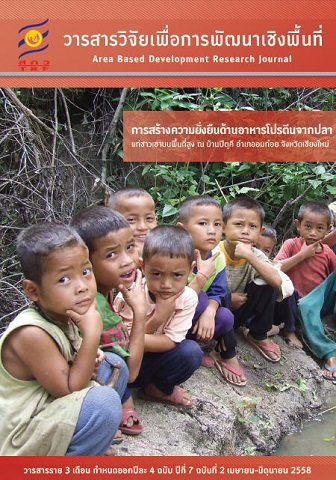รูปแบบการจัดการน้ำบาดาลให้ถูกหลักสุขาภิบาล โดยการมีส่วนร่วมของชุมชนบ้านเก่าน้อย ตำบลธาตุ อำเภอวารินชำราบ จังหวัดอุบลราชธานี
Main Article Content
Abstract
บทคัดย่อไม่สมบูรณ์
Patterns of underground water management for sanitation by community participation in Ban Koawnoi, Tat Sub-district, Warinchamrap District, Ubon Ratchathani Province
The objectives of this research were to 1) study underground water management of communities from the past to the present, 2) study the effect of environmental management in the community on the quality of underground water, 3) study the underground water quality of the community for the consumer, and 4) involve community participation in the discovery of patterns of underground water management for sanitation. The research was based on processes and activities that involved the enhancement of community participation, learning, and exchange between the research team, community members, and relevant stakeholders. The study consisted of the development of a participatory research question, creation of research tools, collection of data by a focus group, community forums, field surveys, analysis and synthesis of data, planning activities and action, holding community forums to discover patterns of underground water management for sanitation.
The results showed that underground water management from the past to the present had been changed about sources and uses of water. Environmental management in the community affected the quality of underground water as 32.65% of solid waste management did not separate hazardous waste from other waste. Results showed that 65.31% of households had septic tanks, 55.10% had waste water, and 26.53% had waste disposal sites within a 30 meter distance. Also, findings indicated the underground water quality of the community exceeded safe water quality standards, including total dissolved solid in ranges 692-1,140 mg/L, and coliform bacteria in ranges 3 to >2,400 MPN / 100 ml.
The findings of patterns of underground water management for sanitation by community participation included (1) distribution of information to motivate perceptions about the situation regarding underground water quality in the community, (2) encouragement about an awareness of the health impact of the consumption of contaminated underground water, (3) promotion of environmental management that affects underground water quality, (4) improvement of the community’s use of underground water for sanitation, and (5) creation of mechanisms to monitor underground water quality in the community.
Article Details
Area Based Development Research Journal values copyright protection and licensing to safeguard author rights and facilitate the appropriate dissemination of research. Our policies ensure openness, accessibility, and attribution. Authors retain copyright ownership, and articles are published under a Creative Commons Attribution License (CC BY), allowing sharing, adaptation, and proper attribution. Authors have the freedom to publish under the CC BY license, granting broad reuse and distribution permissions. The journal supports posting articles on third-party repositories, adhering to institutional and funding restrictions. Author guidelines detail copyright and licensing requirements, empowering authors with knowledge about their rights and responsibilities. These policies cultivate an environment of collaboration, openness, and responsible sharing, benefiting authors and the research community while honoring intellectual property rights.


